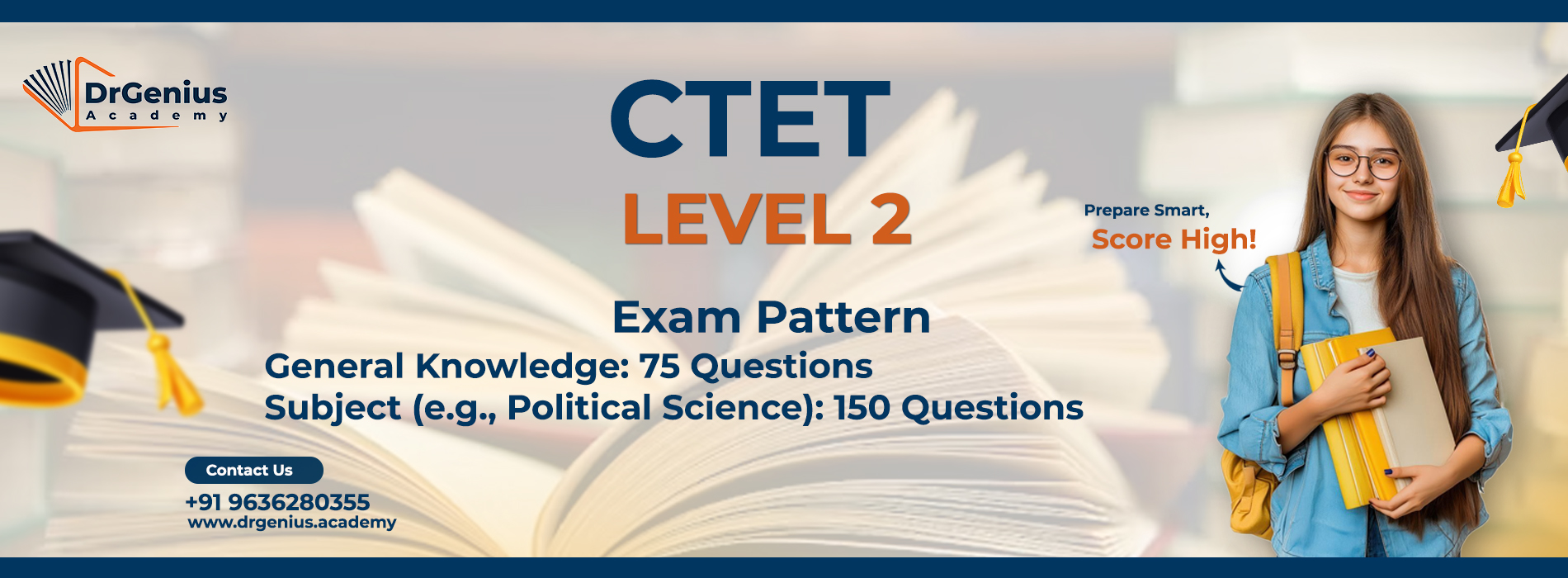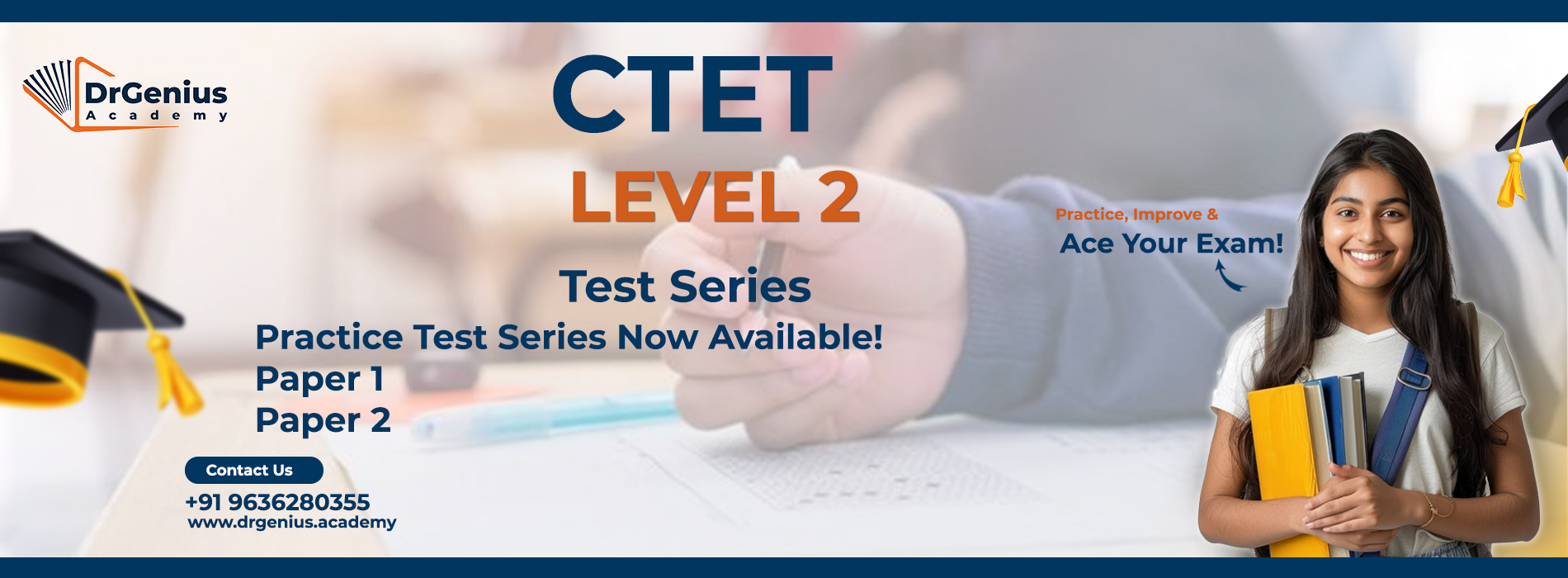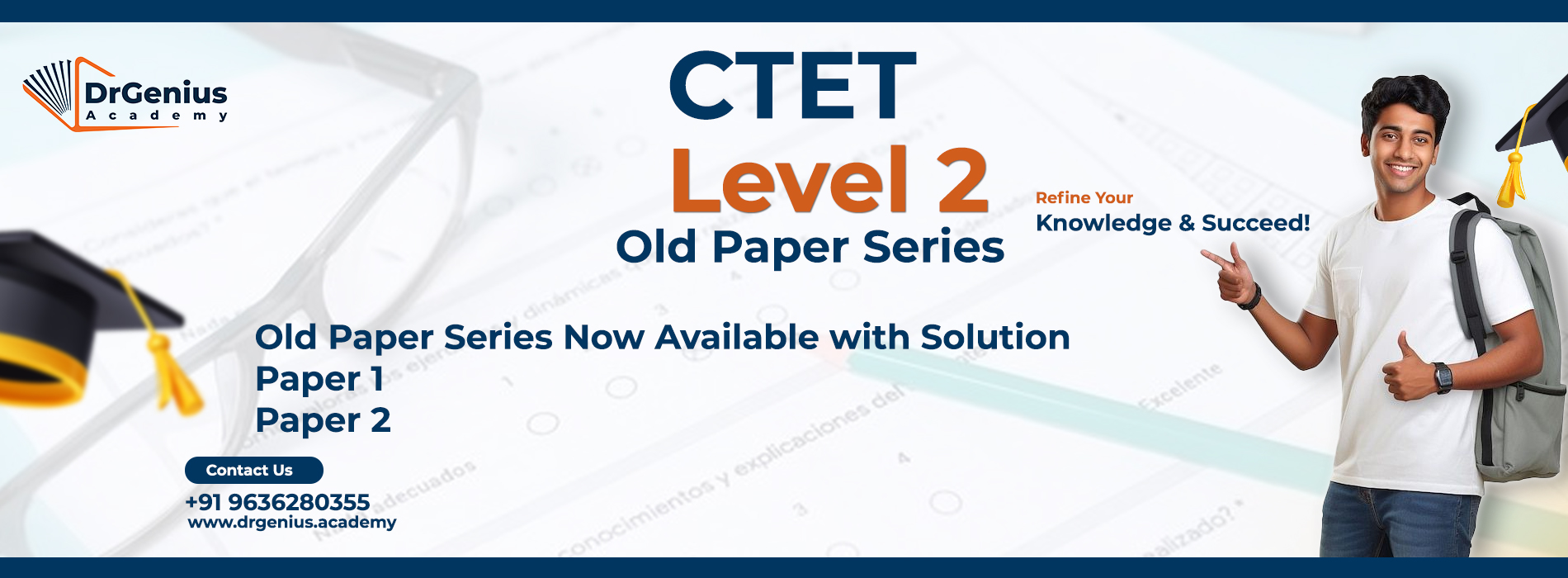CTET Paper 2 Syllabus 2025 – Easy Exam Pattern Guide for Quick Prep




CTET Paper 2
- Notification
- Schems (Pattern)
- Topic
- Syllabus
- Old Paper
- Faculties
- Course
- Test Series
- Fees Structure
- Admit Card
- Instruction For Candidates
- Answer Key
- Cut Off marks
- Result
- All questions in CTET will be Multiple Choice Questions (MCQs) Each carrying one mark and there will be no negative marking.
Paper II (for Classes VI to VIII) Elementary Stage: Duration of examination-Two-and-a-half hours Structure and Content (All Compulsory):
| (i) | Child Development & Pedagogy (compulsory) | 30 MCQs | 30 Marks |
| (ii) | Mathematics and Science (for Mathematics and Science teacher) | 60 MCQs | 60 Marks |
| OR | |||
| (iii) | Social Studies/Social Science (for Social Studies/Social Science teacher) | 60 MCQs | 60 Marks |
| (iv) | Language I (compulsory) | 30 MCQs | 30 Marks |
| (v) | Language II (compulsory) | 30 MCQs | 30 Marks |
| *For any other teacher-either (IV) or (V) | |||
| Total | 150 MCQs | 150 Marks |
|---|
NATURE AND STANDARD OF QUESTIONS:
- The test items on Child Development and Pedagogy will focus on educational psychology of teaching and learning, relevant to the age group of 11-14 years. They will focus on understanding the characteristics, needs and psychology of diverse learners, interaction with learners and the attributes and qualities of a good facilitator of learning.
- The Test items in Language I will focus on the proficiencies related to the medium of instruction.
- The Test items in Language II will focus on the elements of language, communication and comprehension abilities.
- Language II will be a language other than Language I. A candidate may choose any one language as Language I and other as Language II from the available language options and will be required to specify the same in the Confirmation Page.
- Opt two languages in which you wish to appear for CTET : List of languages and code are as follows:
| Language | Code No. | Language | Code No. | Language | Code No. | Language | Code No. |
|---|---|---|---|---|---|---|---|
| English | 01 | Gujarati | 06 | Marathi | 11 | Sanskrit | 16 |
| Hindi | 02 | Kannada | 07 | Mizo | 12 | Tamil | 17 |
| Assamese | 03 | Khasi | 08 | Nepali | 13 | Telugu | 18 |
| Bengali | 04 | Malayalam | 09 | Odia | 14 | Tibetan | 19 |
| Garo | 05 | Manipuri | 10 | Punjabi | 15 | Urdu | 20 |
- The Test items in Mathematics and Science, and Social Studies/Social Science will focus on the concepts, problem solving abilities and pedagogical understanding and applications of the subjects. The test items of Mathematics and Science will be of 30 marks each. The test items will be evenly distributed over different divisions of the syllabus of that subject as prescribed for classes VI-Vlll by the NCERT.
- The questions in the test for Paper II will be based on the topics prescribed in syllabus of the NCERT for classes VI-VIII but their difficulty standard as well as linkages, could be up to the Senior Secondary stage.
I. Child Development and Pedagogy 30 Questions
a) Child Development (Elementary School Child) 15 Questions
- Concept of development and its relationship with learning
- Principles of the development of children
- Influence of Heredity & Environment
- Socialization processes: Social world &children(Teacher, Parents, Peers)
- Piaget, Kohlberg and Vygotsky: constructs and critical perspectives
- Concepts of child-centered and progressive education
- Critical perspective of the construct of Intelligence
- Multi-Dimensional Intelligence
- Language & Thought
- Gender as a social construct; gender roles, gender-bias and educational practice
- Individual differences among learners, understanding differences based on diversity of language, caste, gender, community, religion etc.
- Distinction between Assessment for learning and assessment of learning; School-Based Assessment, Continuous & Comprehensive Evaluation: perspective and practice
- Formulating appropriate questions for assessing readiness levels of learners; for enhancing learning and critical thinking in the classroom and for assessing learner achievement.
I. बाल विकास और शिक्षाशास्त्र 30 प्रश्न
a) बाल विकास (प्राथमिक विद्यालय का बच्चा) 15 प्रश्न
- विकास की अवधारणा और सीखने के साथ इसका संबंध
- बच्चों के विकास के सिद्धांत
- आनुवंशिकता और पर्यावरण का प्रभाव
- समाजीकरण प्रक्रियाएँ: सामाजिक दुनिया और बच्चे (शिक्षक, माता-पिता, सहकर्मी)
- पियाजे, कोहलबर्ग और वायगोत्स्की: निर्माण और आलोचनात्मक दृष्टिकोण
- बाल-केंद्रित और प्रगतिशील शिक्षा की अवधारणाएँ
- बुद्धि के निर्माण का आलोचनात्मक दृष्टिकोण
- बहुआयामी बुद्धि
- भाषा और विचार
- सामाजिक निर्माण के रूप में लिंग; लिंग भूमिकाएँ, लिंग-पूर्वाग्रह और शैक्षिक अभ्यास
- शिक्षार्थियों के बीच व्यक्तिगत अंतर, भाषा, जाति, लिंग, समुदाय, धर्म आदि की विविधता के आधार पर अंतर को समझना।
- सीखने के लिए मूल्यांकन और सीखने के मूल्यांकन के बीच अंतर; स्कूल-आधारित मूल्यांकन, सतत और व्यापक मूल्यांकन: परिप्रेक्ष्य और अभ्यास
- शिक्षार्थियों की तत्परता के स्तर का आकलन करने के लिए उपयुक्त प्रश्न तैयार करना; कक्षा में सीखने और आलोचनात्मक सोच को बढ़ाने के लिए और शिक्षार्थी की उपलब्धि का आकलन करने के लिए।
b) Concept of Inclusive education and understanding children with special needs 5 Questions
- Addressing learners from diverse back grounds including disadvantaged and deprived
- Addressing the needs of children with learning difficulties, “impairment‟ etc.
- Addressing the Talented, Creative, Specially abled Learners
b) समावेशी शिक्षा की अवधारणा और विशेष जरूरतों वाले बच्चों को समझना 5 प्रश्न
- वंचित और वंचित सहित विविध पृष्ठभूमि के शिक्षार्थियों को संबोधित करना
- सीखने की कठिनाइयों, "हानि" आदि वाले बच्चों की जरूरतों को संबोधित करना।
- प्रतिभाशाली, रचनात्मक, विशेष रूप से सक्षम शिक्षार्थियों को संबोधित करना
c) Learning and Pedagogy 10 Questions
- How children think and learn; how and why children„ fail‟ to achieve success in school performance.
- Basic processes of teaching and learning; children’s strategies of learning; learning as a social activity; social context of learning.
- Child as a problem solve rand a “scientific investigator‟
- Alternative conceptions of learning in children, understanding children’s “errors‟ as significant steps in the learning process.
- Cognition & Emotions
- Motivation and learning
- Factors contributing to learning-personal & environmental
ग) सीखना और शिक्षण शास्त्र 10 प्रश्न
- बच्चे कैसे सोचते और सीखते हैं; बच्चे स्कूल के प्रदर्शन में सफलता प्राप्त करने में कैसे और क्यों असफल होते हैं।
- शिक्षण और सीखने की बुनियादी प्रक्रियाएँ; बच्चों की सीखने की रणनीतियाँ; सामाजिक गतिविधि के रूप में सीखना; सीखने का सामाजिक संदर्भ।
- समस्या समाधानकर्ता और "वैज्ञानिक अन्वेषक" के रूप में बच्चा
- बच्चों में सीखने की वैकल्पिक अवधारणाएँ, सीखने की प्रक्रिया में महत्वपूर्ण चरणों के रूप में बच्चों की "त्रुटियों" को समझना।
- अनुभूति और भावनाएँ
- प्रेरणा और सीखना
- सीखने में योगदान देने वाले कारक-व्यक्तिगत और पर्यावरणीय
II. Mathematics and Science 60 Questions
(i) Mathematics 30 Questions
a) Content 20 Questions
- Number System
- Knowing our Numbers
- Playing with Numbers
- Whole Numbers
- Negative Numbers and Integers
- Fractions
- Introduction to Algebra
- Ratio and Proportion
- Basic geometrical ideas(2-D)
- Understanding Elementary Shapes(2-Dand3-D)
- Symmetry : (reflection)
- Construction(using Straight edge Scale, protractor, compasses)
- Mensuration
- Data handling
II. गणित और विज्ञान 60 प्रश्न
(i) गणित 30 प्रश्न
a) सामग्री 20 प्रश्न
- संख्या प्रणाली
- अपनी संख्याओं को जानना
- संख्याओं के साथ खेलना
- पूर्ण संख्याएँ
- ऋणात्मक संख्याएँ और पूर्णांक
- अंश
- बीजगणित का परिचय
- अनुपात और अनुपात
- बुनियादी ज्यामितीय विचार (2-डी)
- प्राथमिक आकृतियों को समझना (2-डी और 3-डी)
- समरूपता: (प्रतिबिंब)
- निर्माण (सीधे किनारे के पैमाने, प्रोट्रैक्टर, कम्पास का उपयोग करके)
- मापन
- डेटा हैंडलिंग
b) Pedagogical issues 10 Questions
- Nature of Mathematics / Logical thinking
- Place of Mathematics in Curriculum
- Language of Mathematics
- Community Mathematics
- Evaluation
- Remedial Teaching
- Problem of Teaching
ख) शैक्षणिक मुद्दे 10 प्रश्न
- गणित की प्रकृति / तार्किक सोच
- पाठ्यक्रम में गणित का स्थान
- गणित की भाषा
- सामुदायिक गणित
- मूल्यांकन
- उपचारात्मक शिक्षण
- शिक्षण की समस्या
ii) Science 30 Questions
(a) Content 20 Questions
- Food
- Sources of food
- Components of food
- Cleaning food
- Materials
- Materials of daily use
- The World of the Living
- Moving Things People and Ideas
- How things work
- Electric current and circuits
- Magnets
- Natural Phenomena
- Natural Resources
ii) विज्ञान 30 प्रश्न
(क) विषय-वस्तु 20 प्रश्न
- भोजन
- भोजन के स्रोत
- भोजन के घटक
- भोजन की सफाई
- सामग्री
- दैनिक उपयोग की सामग्री
- जीवितों की दुनिया
- चलती हुई चीजें, लोग और विचार
- चीजें कैसे काम करती हैं
- विद्युत धारा और सर्किट
- चुम्बक
- प्राकृतिक घटनाएं
- प्राकृतिक संसाधन
b) Pedagogical issues 10 Questions
- Nature & Structure of Sciences
- Natural Science / Aims & objectives
- Understanding & Appreciating Science
- Approaches/Integrated Approach
- Observation / Experiment / Discovery (Method of Science)
- Innovation
- Text Material / Aids
- Evaluation-cognitive / psycho-motor / affective
- Problems
- Remedial Teaching
ख) शैक्षणिक मुद्दे 10 प्रश्न
- विज्ञान की प्रकृति और संरचना
- प्राकृतिक विज्ञान / लक्ष्य और उद्देश्य
- समझ और विज्ञान की सराहना
- दृष्टिकोण/एकीकृत दृष्टिकोण
- अवलोकन / प्रयोग / खोज (विज्ञान की विधि)
- नवाचार
- पाठ्य सामग्री / सहायता
- मूल्यांकन-संज्ञानात्मक / मनो-प्रेरक / भावात्मक
- समस्याएँ
- उपचारात्मक शिक्षण
III. a) Social Studies / Social Sciences 60 Questions
Content 40 Questions
History- When, Where and How
- The Earliest Societies
- The First Farmers and Herders
- The First Cities
- Early States
- New Ideas
- the first Empire
- Contacts with Distant lands
- Political Developments
- Culture and Science
- New Kings and Kingdoms
- Sultans of Delhi
- Architecture
- Creation of an Empire
- Social Change
- Regional Cultures
- The Establishment of Company Power
- Rural Life and Society
- Colonialism and Tribal Societies
- The Revolt of 1857-58
- Women and reform
- Challenging the Caste System
- The Nationalist Movement
- India After Independence
तृतीय. क) सामाजिक अध्ययन / सामाजिक विज्ञान 60 प्रश्न
विषय-वस्तु 40 प्रश्न
इतिहास- कब, कहाँ और कैसे
- सबसे पुराने समाज
- पहले किसान और चरवाहे
- पहले शहर
- शुरुआती राज्य
- नए विचार
- पहला साम्राज्य
- दूर-दराज की भूमि से संपर्क
- राजनीतिक विकास
- संस्कृति और विज्ञान
- नए राजा और राज्य
- दिल्ली के सुल्तान
- वास्तुकला
- एक साम्राज्य का निर्माण
- सामाजिक परिवर्तन
- क्षेत्रीय संस्कृतियाँ
- कंपनी की सत्ता की स्थापना
- ग्रामीण जीवन और समाज
- उपनिवेशवाद और आदिवासी समाज
- 1857-58 का विद्रोह
- महिलाएँ और सुधार
- जाति व्यवस्था को चुनौती
- राष्ट्रवादी आंदोलन
- स्वतंत्रता के बाद का भारत
- Geography as a social study and as a science
- Planet: Earth in the solar system
- Globe
- Environment in its totality: natural and human environment
- Air
- Water
- Human Environment: settlement, transport and communication
- Resources: Types-Natural and Human
- Agriculture
- सामाजिक अध्ययन और विज्ञान के रूप में भूगोल
- ग्रह: सौरमंडल में पृथ्वी
- ग्लोब
- पर्यावरण अपनी संपूर्णता में: प्राकृतिक और मानवीय पर्यावरण
- वायु
- जल
- मानवीय पर्यावरण: बसावट, परिवहन और संचार
- संसाधन: प्रकार-प्राकृतिक और मानवीय
- कृषि
- Diversity
- Government
- Local Government
- Making a Living
- Democracy
- State Government
- Understanding Media
- Unpacking Gender
- The Constitution
- Parliamentary Government
- The Judiciary
- Social Justice and the Marginalised
- विविधता
- सरकार
- स्थानीय सरकार
- जीविका कमाना
- लोकतंत्र
- राज्य सरकार
- मीडिया को समझना
- लिंग को समझना
- संविधान
- संसदीय सरकार
- न्यायपालिका
- सामाजिक न्याय और हाशिए पर पड़े लोग
II. Pedagogical issues 20 Questions
- Concept & Nature of Social Science/Social Studies
- Class Room Processes, activities and discourse
- Developing Critical thinking
- Enquiry/Empirical Evidence
- Problems of teaching Social Science/Social Studies
- Sources- Primary & Secondary
- Projects Work
- Evaluation
II. शैक्षणिक मुद्दे 20 प्रश्न
- सामाजिक विज्ञान/सामाजिक अध्ययन की अवधारणा और प्रकृति
- कक्षा प्रक्रियाएँ, गतिविधियाँ और प्रवचन
- आलोचनात्मक सोच विकसित करना
- जाँच/अनुभवजन्य साक्ष्य
- सामाजिक विज्ञान/सामाजिक अध्ययन पढ़ाने की समस्याएँ
- स्रोत- प्राथमिक और माध्यमिक
- परियोजना कार्य
- मूल्यांकन
IV. Language I 30 Questions
Language Comprehension 15 Questions
- Reading unseen passages-two passages one prose or drama and one poem with questions on comprehension, inference, grammar and verbal ability (Prose passage may be literary, scientific, narrative or discursive)
Pedagogy of Language Development 15 Questions
- Learning and acquisition
- Principles of language Teaching
- Role of listening and speaking; function of language and how children use
- IT as a tool
- Critical perspective on the role of grammar in learning a language for communicating ideas verbally and in written form;
- Challenges of teaching language in a diverse classroom; language difficulties, errors and disorders
- Language Skills
- Evaluating language comprehension and proficiency: speaking, listening, reading and writing
- Teaching-learning materials:Textbook,multi-media materials,multi lingual resource of the classroom
- Remedial Teaching
IV. भाषा I 30 प्रश्न
भाषा समझ 15 प्रश्न
- अनदेखे अंशों को पढ़ना-दो अंश, एक गद्य या नाटक और एक कविता, जिसमें समझ, अनुमान, व्याकरण और मौखिक क्षमता पर प्रश्न हों (गद्य अंश साहित्यिक, वैज्ञानिक, कथात्मक या विवेचनात्मक हो सकते हैं)
भाषा विकास का शिक्षणशास्त्र 15 प्रश्न
- सीखना और अधिग्रहण
- भाषा शिक्षण के सिद्धांत
- सुनने और बोलने की भूमिका; भाषा का कार्य और बच्चे इसका उपयोग कैसे करते हैं
- एक उपकरण के रूप में आईटी
- मौखिक और लिखित रूप में विचारों को संप्रेषित करने के लिए भाषा सीखने में व्याकरण की भूमिका पर महत्वपूर्ण परिप्रेक्ष्य;
- विविध कक्षा में भाषा शिक्षण की चुनौतियाँ; भाषा संबंधी कठिनाइयाँ, त्रुटियाँ और विकार
- भाषा कौशल
- भाषा की समझ और दक्षता का मूल्यांकन: बोलना, सुनना, पढ़ना और लिखना
- शिक्षण-अधिगम सामग्री: पाठ्यपुस्तक, मल्टीमीडिया सामग्री, कक्षा का बहुभाषी संसाधन
- उपचारात्मक शिक्षण
V. Language-II 30 Questions
Comprehension 15 Questions
- Two unseen prose passages (discursive or literary or narrative or scientific) with question on comprehension, grammar and verbal ability
V. भाषा-II 30 प्रश्न
समझ 15 प्रश्न
- समझ, व्याकरण और मौखिक क्षमता पर प्रश्न के साथ दो अदृश्य गद्य अंश (विवेचनात्मक या साहित्यिक या कथात्मक या वैज्ञानिक)
Pedagogy of Language Development 15 Questions
- Learning and acquisition
- Principles of language Teaching
- Role of listening and speaking; function of language and how children use it as a tool
- Critical perspective on the role of grammar in learning a language for communicating ideas verbally and in written form;
- Challenges of teaching language in a diverse classroom ; language difficulties, errors and disorders
- Language Skills
- Evaluating language comprehension and proficiency: speaking, listening, reading and writing
- Teaching- learning materials:Textbook,multi-media materials, multi lingual resource of the classroom
- Remedial Teaching
भाषा विकास का शिक्षणशास्त्र 15 प्रश्न
- सीखना और अधिग्रहण
- भाषा शिक्षण के सिद्धांत
- सुनने और बोलने की भूमिका; भाषा का कार्य और बच्चे इसे एक उपकरण के रूप में कैसे उपयोग करते हैं
- मौखिक और लिखित रूप में विचारों को संप्रेषित करने के लिए भाषा सीखने में व्याकरण की भूमिका पर महत्वपूर्ण परिप्रेक्ष्य;
- विविधतापूर्ण कक्षा में भाषा शिक्षण की चुनौतियाँ; भाषा संबंधी कठिनाइयाँ, त्रुटियाँ और विकार
- भाषा कौशल
- भाषा की समझ और दक्षता का मूल्यांकन: बोलना, सुनना, पढ़ना और लिखना
- शिक्षण-अधिगम सामग्री: पाठ्यपुस्तक, मल्टीमीडिया सामग्री, कक्षा का बहुभाषी संसाधन
- उपचारात्मक शिक्षण
EDUCATION QUALIFICATION
Candidates must have cleared the Graduation and also must have cleared or still pursuing the final year of 2 years Diploma in Elementary Education from a recognized University/Institution.
OR
Candidates must have cleared the Graduation (with minimum 50% marks) and passed or appeared in the first year of Bachelor in Education (B.Ed) from a recognized University/Institution.OR
Candidates must have cleared the Graduation (with a minimum of 45% marks) and passed or appeared in 1 year of bachelor's Degree in Education (B.Ed), in accordance with the NCTE Regulations in Education (B.Ed).OR
Senior Secondary (or its equivalent) with at least 50% marks and Candidates must have cleared the Graduation of a 4-year Bachelor in Elementary Education (B.EI.Ed).OR
Senior Secondary (or its equivalent) with at least 50% marks and Candidates must have cleared the Graduation of 4-year B.A/B.Sc.Ed or B.A.Ed/B.Sc.Ed.OR
Graduation with at least 50% marks and Candidates must have cleared or appeared in 1-year B.Ed. (Special Education).OR
Candidates must have cleared the Graduation in B.Ed. Programs recognized by the NCTE are eligible to appear in TET/CTET.AGE
- Minimum Age- 17 years.
- Maximum Age- No limit
CTET ELIGIBILITY FOR RESERVED CATEGORY
- Candidates in the general category must score a minimum of 60% to pass the CTET exam.
- For reserved categories like scheduled caste (SC), scheduled tribe (ST), other backward class (OBC), and differently-abled candidates, there is a 5% relaxation in the qualifying marks. This means that candidates belonging to the OBC/SC/ST categories need to score at least 55% to pass the CTET exam as per the CBSE CTET Eligibility rules
VALIDITY PERIOD OF CTET CERTIFICATE;
- The Validity Period of CTET qualifying certificate for appointment will be for life time for all categories.

